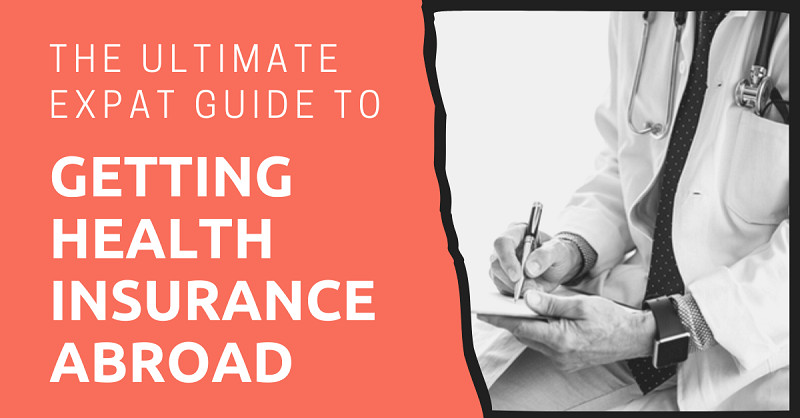
This article will take approximately 41 minutes to read. Don't have the time right now? No worries. Email the ad-free version of the article to yourself and read it later!
Moving abroad is exciting, but the thought of navigating foreign healthcare systems can be overwhelming.
What if you get sick? Will your home insurance work? How much will treatment cost? You have valid concerns — medical emergencies abroad can devastate you financially without proper coverage.
The good news is that expat health insurance eliminates these worries, giving you more coverage and peace of mind to fully enjoy your international adventure.
By the end of this guide, you’ll know what kind of insurance is available to you while living abroad, how to pick the right plan, what warning signs to look out for, and much more.
If you’d rather save time and have someone else handpick the right plan for you, get in touch with one of our vetted insurance brokers.
Disclaimer: This article may include links to products or services offered by ExpatDen's partners, which give us commissions when you click on them. Although this may influence how they appear in the text, we only recommend solutions that we would use in your situation. Read more in our Advertising Disclosure.
Contents
- Why Expat Health Insurance Matters
- Do You Actually Need Health Insurance Abroad?
- When to Secure Your Health Insurance
- Your Three Expat Health Insurance Options: International, Local, and Private
- Pre-Existing Conditions: Here's What You Need to Know
- Choosing the Right Health Insurance Plan for Your Life Abroad
- Renewing and Continuing Your Expat Health Insurance
- Red Flags and Warning Signs When Buying Expat Health Insurance
- Should You Use Travel Insurance as an Expat Abroad?
- Using Your Current Health Insurance for Coverage Abroad
- FAQs About Expat Health Insurance
- Is Local Insurance Sufficient for Expats?
- Does Expat Insurance Cover Me in Multiple Countries or Just the Country I'm Moving to?
- What Hospitals and Clinics are in the Network? Can I Choose Where I Get Treated?
- Are Pre-existing Conditions Covered? If Not, After How Long Might They Be?
- What's the Deductible or Excess I'll Pay Before Coverage Kicks in?
- Does Expat Insurance Cover Outpatient Care, Prescriptions, and Emergency Services -- or Just Hospitalization?
- Are Maternity, Mental Health, and Dental Covered? If Not, Can I Add Them Later?
- Is Repatriation or Medical Evacuation Included?
- Can I Renew the Policy Annually, and Will I Still Be Covered if I Move to Another Country or Return Home?
- How is Customer Support? Do They Have 24/7 Emergency Support and Local-Language Assistance?
- Expat Health Insurance Resources
Why Expat Health Insurance Matters
As an expat, you might decide to get health insurance while living abroad for the following reasons:
- Manage your healthcare budget: You won’t have to break the bank when you suddenly need expensive medical treatment.
- Prevents serious medical conditions: Visiting a hospital early on gives you the chance to find out if you have any serious disease at the earliest stage and get treatment before it worsens or turns into something serious.
- Assists in finding the right hospital: Having expat health insurance means you can find the right hospital. Just call your insurer and they’ll tell you which hospital you should go to without having to look for yourself.
- Peace of mind: If you have insurance, you won’t need to worry about your health expenses if something happens to you. This lets you live a worry-free life as an expat.
- Qualify for your visa: Certain visas require you to have a minimum amount of health insurance coverage. Local insurance doesn’t always meet those minimums. So it’s better to have expat health insurance.
On the other hand, many people decide not to get health insurance because it can be outside of their budget, especially for those over 60 years old. If you’re at this age, your health insurance premium can easily exceed US$3,000 per year.
Therefore, to help you decide whether or not you should get health insurance, you can get your free quote now to see what coverage you can get and how much it’ll cost.
With that said, do you actually need health insurance while living abroad? Let’s look closely at the answer.
Do You Actually Need Health Insurance Abroad?
To answer this question, you have to consider three important things. First, refer to the laws of the country you’re moving to. Currently, many countries require you to have health insurance to stay long-term.
Some of them include:
- United States
- Germany
- Switzerland
- Netherlands
- Japan
- UAE
- Saudi Arabia
- Singapore
- Qatar
- Israel
Some countries don’t require you to have health insurance, especially those around Southeast Asia. But there are some exceptions. For example, in Thailand, you must have health insurance if you’re applying for a retirement visa.
So be sure to check the visa you’re applying for in the country. If health insurance is required, you’ll need to get it.
Second, you also need to ask yourself how much risk you’re willing to take by not getting insurance. Sure, in countries like India that don’t require mandatory health insurance, you can pay out of pocket for minor treatments and checkups and face little-to-no financial risk.
But what happens when you’re facing a serious health concern and need surgery or long-term treatment? In the Philippines, one of the preferred countries for retired expats, it could cost up to US$27,000 for major surgery. It wouldn’t make sense to pay for hospital bills out of pocket when you could’ve been covered for a lot less.
On the flip side, you also have to ask yourself how much you’re willing to pay for coverage without putting a burden on your pockets. For some, a few hundred dollars a month may be within budget. For others, that price wouldn’t get them the coverage they want.
Now that you know why it’s important to have health insurance as an expat, let’s look at when in your moving process you should get it.
When to Secure Your Health Insurance
If you need health insurance as soon as you get to your new country, you should start looking for different plans and/or providers at least two months before your moving date.
Based on my discussions with various brokers, this is how long it takes for people to go from showing an interest in buying health insurance to getting coverage after the consultation.
Two months will give you enough time to compare different plans and options since you’ll likely be busy preparing your belongings and sorting out your move.
Also, the underwriting process takes around one week after you fill out the application, send your documents, make a payment, and get approved.

Your Three Expat Health Insurance Options: International, Local, and Private
No matter where you move to in the world, you have three main options for health insurance:
- International health insurance
- Public health insurance
- Local private health insurance
Let’s take a closer look at each one.
International Health Insurance Deep Dive
Expats choose international health insurance most often because companies design it for the challenges of international living.
Unlike local or public insurance options, international coverage provides extensive global coverage that covers you wherever you go — in many cases. Here’s everything you need to know about how international health insurance works and whether it’s right for your situation.
- International insurance coverage: You can visit any hospital in the world and the insurance company covers the costs. Coverage includes hospitalization, cancer treatment, medications, scans, medical evacuation, maternity, outpatient coverage, dental care, and emergency treatment. Coverage depends on the plan and provider, and you may need to pay extra for outpatient care, dental, and medical evacuation.
- International insurance area of coverage: This is what sets international health insurance apart from other types of insurance — it comes with global coverage. They will inform you which countries they cover, providing coverage in places popular with expats unless they state otherwise. Some insurance companies offer plans covering only specific regions like Asia-Pacific or Europe. Most insurance companies won’t provide coverage in the US because of high healthcare costs, with GeoBlue being the exception. International insurance also pays for medical expenses in your home country with certain conditions, requiring you to be there for less than 30 to 90 days per year.
- International insurance yearly limits: International health plans usually come with a yearly limit of at least US$1,000,000, which is the maximum amount the insurance company will pay every year. This limit should cover you for most countries except those with high costs like Switzerland or the US. Companies offer plans with higher yearly limits or unlimited coverage, but these cost more.
- International insurance exclusions: International insurance plans exclude pre-existing conditions as their main limitation. The only way to avoid pre-existing condition exclusions is buying health insurance before you develop the condition. Waiting periods also apply — many international health insurance plans require 180 to 270 days before maternity care coverage begins. Plans also exclude self-inflicted injury, fertility treatment, and cosmetic treatment unless medically necessary.
- International insurance medical assistance: Medical assistance is a key benefit often overlooked. You can contact your insurance company and they’ll recommend hospitals or doctors specializing in your condition anywhere in the world. For some international health insurance plans like Cigna Global, you can talk to licensed doctors by phone anywhere in the world and get telemedicine services for non-emergency treatments.
- International insurance claims process: To claim medical payments, there are two main scenarios. Direct billing allows international health insurance companies to pay hospitals directly within their networks. For areas without network hospitals, contact your provider to arrange direct billing. Online claims require sending hospital bills to the insurance company later, typically through online customer support systems where you upload receipts and files.
- International insurance costs: International insurance can be the most expensive option, with premiums varying based on your plan, age, and medical conditions. When considering pay-per-coverage value, international health insurance often appears cheaper than local insurance because of much higher coverage limits.
- International insurance companies: Popular options include Cigna Global for complete flexible plans, GeoBlue for affordable plans with US coverage, IMG Global for affordable plans with various deductible options, and William Russell for high-level coverage. There’s no single best provider as each plan has pros and cons depending on your specific needs and whether you buy individual or family coverage.
International insurance offers the most full-scale coverage for expats but requires careful evaluation of coverage zones, exclusions, and costs to ensure it matches your needs.
To give you a head-start, check out our expat health insurance comparison page to get a side-by-side comparison of all recommended international health insurance companies.
Public Health Insurance Deep Dive
Public insurance is the cheapest type of health insurance available to expats. While public healthcare systems can provide coverage for basic medical needs, they come with ceilings that make them inefficient for many expats.
Knowing how public healthcare systems work helps you figure out if they can serve as your primary coverage or if you need private insurance to supplement gaps in coverage.
- Public insurance coverage: Public insurance is cited as “free healthcare” that covers pre-existing conditions. But you will pay for public insurance directly or indirectly through taxes. The free treatment is for treatments that doctors deem necessary. You’ll also be limited to certain medications. Otherwise, you need to pay out of pocket. Another disadvantage is that it’s not available to those who don’t work or have tax residency in the country. But Mexico has IMSS, a public insurance program that lets expats enroll and get public health coverage.
- Public insurance exclusions: Public insurance will cover basic medical treatments that are necessary for any given medical condition. It pays for the cost of doctors and medicine but may not pay for extra costs that the hospital charges, including food, toiletries, and so on. Cosmetic treatment, fertility treatment, and any other treatment that aren’t medical necessities will also not be covered.
- Public insurance claims: Most countries have similar procedures when it comes to making a claim with public insurance. The government will pay the hospital, provided you go to a hospital that’s assigned to you. If you go to other hospitals, even a public one, chances are you won’t be able to claim your medical expenses.
- Public insurance application: In every country, there’s a different procedure when applying for public insurance. If you’re employed, your employer will apply for social security on your behalf, or you’ll need to visit a district office to apply. You can’t apply for public insurance right away though. Each country has its own requirements. For example, you need to stay in Canada for over 183 days before you can apply for Canadian public healthcare.
- Public insurance challenges: Public insurance can save you a lot of money, but there are many challenges that come with using it as an expat. You might have to wait the whole day to see a doctor for five minutes. Or you have to wait months or even years for surgery. The hospitals you can visit are limited, and one visit requires many steps.
When explaining to expats about public healthcare systems, I often use Costa Rica as an example because many other countries follow similar patterns. If you have to see a doctor, you need to visit a local clinic first. If the doctor can’t treat you, he or she will refer you to a bigger hospital. And you can’t choose a doctor. For inpatient treatment, you will share a room with limited space. This process isn’t suitable for expats.
To use public healthcare, most of the time you need to speak the local language or bring someone who can with you. Even in countries with good healthcare systems like Germany, Canada, and Spain, long wait times are also a problem. This is why a majority of expats worldwide opt to get private insurance on top of public insurance, to get more treatment options and higher quality services.
Local Private Health Insurance Deep Dive
Private insurance offered by local insurance companies is another option available to you as an expat. Local insurance provides excellent value for expats planning long-term stays in one country. But coverage varies between countries and often comes with restraints that make it unsuitable if you travel often.
Knowing these differences helps you figure out whether local private coverage makes sense for your specific needs.
- Local private insurance coverage: In general, local private insurance will pay for your health expenses in the country you live in. But you get lower yearly limits compared to international health insurance. Plus medical evacuation is usually not covered by local insurance. That does make it less expensive though. Local insurance systems also vary. In Indonesia, some plans have separate limits with US$3,000 for surgery and hospital rooms capped at US$150 per day. And in Thailand local plans use per-treatment limits instead of yearly limits.
- Local private insurance exclusions: Local private insurance has similar exclusions as international plans. They won’t pay for pre-existing conditions and there’s also a waiting period for certain treatments. The insurance may not pay if you ride a motorcycle without a driving license and get into an accident. Self-inflicted injury, alcoholism, cosmetic surgery, and fertility treatment are also excluded.
- Local private insurance costs: Local insurance tends to be cheaper than international health insurance. For example, you can get a local health insurance plan in Thailand for less than US$500 a year, but the coverage limit can be capped at US$15,000 per treatment while international health insurance coverage starts at US$1,000,000. So when looking from a cost-per-coverage perspective, local insurance can be more expensive than international health insurance.
- Local private insurance claims process: One benefit of local insurance is the ease in the claims process. Local insurance companies tend to have direct billing systems set up with hospitals. This means you can go to most hospitals or clinics within the country and have insurance pay your bill without making a claim later.
Local private insurance works best for long-term expats who know local healthcare systems well. But if you move around frequently, consider choosing international over local private health insurance.
Pre-Existing Conditions: Here’s What You Need to Know
A pre-existing condition is any medical condition you had before buying health insurance. This is the most complex aspect of expat insurance because different insurers handle pre-existing conditions through different underwriting processes, each with distinct pros and cons.
Knowing these processes helps you choose the right policy and avoid financial surprises when you need healthcare most. Here’s how you can work around with pre-existing conditions, if you have any, when getting international health insurance.
If you do have any pre-existing conditions, talk to a licensed broker and let them find an option for you.
- Moratorium underwriting: You don’t disclose your full medical history when applying, but any condition you had symptoms, treatment, advice, or medication for in the past two to five years is excluded. For example, if you’re an American expat in the UK and had asthma treatment 18 months before your policy started, your asthma would be excluded. If you go two continuous years without any symptoms, treatment, or advice while insured, you’ll then be covered. If you have an asthma attack during the two to five years, the moratorium clock resets.
- Full medical underwriting: You must disclose your complete medical history when applying. The insurer reviews your records and decides whether to cover pre-existing conditions, exclude them, or charge higher premiums. Some insurers will cover stable conditions like controlled diabetes or hypertension with premium increases of 20 to 50 percent. This process takes longer but provides certainty about what you’re covered for from day one.
- Non-disclosure risks: Don’t assume you can skip telling the insurance company about pre-existing conditions because they will find out through medical records, prescription databases, or claim investigations. Non-disclosure can void your entire policy, leaving you responsible for all medical bills and unable to get coverage elsewhere due to your claims history.
- Strategic timing: The only way to avoid pre-existing condition exclusions is buying health insurance before you develop any conditions. Secure total coverage while healthy, then maintain guaranteed renewable policies throughout your life. Waiting until you need coverage often means paying more or facing exclusions for the conditions you need coverage for.
Handling pre-existing conditions varies between insurers and underwriting types. This means you have to choose carefully for your long-term healthcare security abroad. But with all that said, in the next section you’ll find out how you can narrow down your choices for expat health insurance.
Choosing the Right Health Insurance Plan for Your Life Abroad
Choosing expat health insurance isn’t about finding the best plan — it’s about finding the right plan for your specific needs. Here’s how to decide and not regret it.
Pay Attention to the Region You’re Moving To
When looking for health insurance that will cover you abroad, consider the region you’re going to live in. Asia, the Middle East, Europe, and North America all have different healthcare systems. What does this mean for you? You have to make sure your insurance is sufficient enough in these areas.
- Southeast Asia: Singapore’s healthcare system provides Western-quality care at Western prices with outpatient visits costing US$110 to US$220. Thailand offers quality private care at lower costs, so you can pay out of pocket for outpatient care and skip coverage to reduce premiums. Vietnam requires careful insurer selection, while Japan’s healthcare system combines universal coverage with expensive private options. Understanding these cost differences helps you avoid over-insuring in affordable locations.
- Middle East: Employers must provide health insurance with minimum coverage of US$100,000 to US$500,000, but these plans cover only bare essentials and may exclude family members. Employer plans typically exclude pre-existing conditions, outpatient care, and mental health services. While Dubai has a solid public healthcare system for expats, you will need supplemental private insurance if you want to cover your family.
- Europe: The European Health Insurance Card (EHIC) covers EU nationals for emergency care across member states, while UK residents use the Global Health Insurance Card (GHIC) with limited post-Brexit coverage. These cards only cover state healthcare during short visits. EU residents moving long-term should apply for S1 forms. Germany and France have excellent public systems but long waits, while Switzerland requires mandatory private insurance.
- North America: US healthcare costs are extreme with emergency room visits costing US$3,000 to US$15,000, and routine surgery from US$20,000 to US$100,000. Canada offers universal healthcare but has lengthy wait times. Both countries have complex provider networks where going out-of-network increases costs by 200 percent to 500 percent. Many international insurers exclude US coverage for expats due to costs.
Each region presents unique challenges that impact your insurance strategy — from Southeast Asia’s differing costs to North America’s extreme expenses requiring maximum coverage. But you also have to weigh your risks.
Assess Your Risks
Start planning for your insurance needs by knowing your risk factors, as these impact both your coverage needs and premiums.
- Age and health status drive everything: If you’re under 40 with no health issues, you can often choose higher deductibles and focus on emergency coverage. Over 50 with pre-existing conditions? You need coverage with guaranteed renewals and minimal exclusions, despite the cost.
- Lifestyle and activity level: Adventure sports enthusiasts need policies that cover high-risk activities without exclusions, like studying Muay Thai in Thailand or ziplining in Costa Rica. Sedentary office workers can skip adventure sports coverage but might need mental health and preventative care benefits instead.
- Family situations change your entire calculation: Single expats can take risks that families cannot. If you have dependents, guaranteed renewals and maternity coverage become non-negotiable, even if premiums are higher.
Your risk profile impacts whether you should pick cost savings or in-depth coverage — getting this assessment wrong could hurt your pockets. That said, you also have to consider your priorities.
Determine Your Coverage Priorities
Not all coverage is equally important for every expat, and knowing your priorities helps you allocate money where it matters most.
- Inpatient vs. outpatient coverage: If you’re healthy and living somewhere with affordable routine care like in Southeast Asia, skipping outpatient coverage can save US$1,000 a year. But if you have chronic conditions requiring regular monitoring, outpatient coverage becomes essential despite the cost.
- Location coverage affects everything: Asia-Pacific coverage costs 40 percent to 60 percent less than worldwide coverage including in the US. If you’ll never visit high-cost countries, getting local coverage makes sense. But if you travel often, worldwide coverage would be better for you.
- Emergency evacuation and repatriation: Living in Bangkok with excellent medical hospitals? Medical evacuation coverage is less critical. Living in rural areas with limited healthcare? Evacuation coverage becomes a potentially life-saving necessity worth prioritizing over other benefits.
If you match coverage priorities to your actual needs, you’ll prevent paying for benefits you’ll never use while getting coverage where you need it most.
Consider Your Budget
Your budget should align with your coverage, but knowing the real costs of inadequate coverage is crucial for making informed trade-offs.
- Total cost includes deductibles and copays: A US$2,000 premium with a US$500 deductible might cost more than a US$3,000 premium with no deductible if you use healthcare often. Calculate potential out of pocket maximums, not just premium costs, when comparing options.
- Premium vs. financial risk balance: Can you afford a US$10,000 medical emergency? Then higher deductibles make sense. Would a US$10,000 bill create financial hardship? Pay higher premiums for lower deductibles and more coverage, even if it strains your budget.
- Long-term premium growth planning: Insurance premiums increase five percent to 15 percent every year, and age-related increases accelerate after 50. Your US$2,000 premium today becomes US$4,000 to US$6,000 by the time you’re 65. Budget for long-term premium growth, especially if you plan to stay abroad long-term.
Financial planning for healthcare costs requires balancing current affordability with future needs and potential emergency expenses. And once you do all that, you can then formulate a plan to help you pick the right coverage, which I cover next.

Create Your Decision Matrix
Once you know your risk profile, destination needs, coverage priorities, and budget, use a systematic approach to compare options and then decide. This matrix is used by many top insurance brokers to help clients like you decide which health insurance plan is best for them.
- List your non-negotiables: These might include guaranteed renewals, specific coverage limits, or coverage areas. Eliminate any policy that doesn’t meet these requirements, no matter the price or other benefits.
- Score remaining options using a 1-10 scale: Scores items based on their importance to your situation. Network quality might be worth 30 percent, while premiums might be 20 percent, and coverage another 25 percent.
- Consider intangible factors: Think about customer service quality, claims processing reputation, and broker relationships. These factors often influence your satisfaction with a policy more than specific benefits or costs.
You should decide based on your needs, not generic best practices that might not apply to your situation. So use the matrix above to help you pick a plan.
Renewing and Continuing Your Expat Health Insurance
One of the biggest mistakes you could make as an expat is to focus only on getting coverage. You also need to know how renewals work. If you have certain renewal clauses, you can be denied coverage when you need it most.
For instance, as you get older or develop health issues. That said, here’s what you must know to keep your insurance active as an expat.
Understand Guaranteed Vs. Conditional Renewals
One of the most critical yet overlooked aspects of expat health insurance is renewal terms. The wrong renewal clause can leave you uninsured when you need coverage most as you age or develop health conditions.
Many expats focus solely on coverage and premiums without realizing that renewal terms dictate whether their policy will actually protect them long-term. Here’s what you must know about renewal guarantees before signing any policy.
- Guaranteed renewals provide lifetime protection against policy cancellation: Guaranteed renewal means the insurance company can’t cancel your policy or refuse to renew it, despite your age, health changes, or claims history. This is gold-standard protection for expats planning to stay abroad long-term. The insurer must continue covering you even if you develop expensive chronic conditions after your policy begins.
- Conditional renewals allow insurers to modify or cancel your coverage yearly: Conditional renewals let the insurance company review your case every year and potentially exclude new conditions that develop, increase your premiums, refuse to renew your policy entirely, or change coverage terms.
- Red flag renewal terms that should concern you: Watch for policies offering “renewable to age 65” then switching to conditional terms, yearly policy reviews based on claims experience, premium increases tied to individual health changes rather than age bands, and exclusions that can be added at renewal time. These terms mean your coverage becomes less reliable as you get older.
- Protective renewal features worth paying extra premiums to secure: Look for lifetime renewal guarantees with clear premium increase schedules, coverage that includes conditions developed after your policy starts, and policies regulated in jurisdictions with strong consumer protection like EU-regulated insurers versus offshore insurers. These features cost more upfront but provide invaluable long-term security.
Renewal terms separate quality long-term coverage from policies that may abandon you when you need coverage most. So, decide carefully because your future healthcare security is on the line. But whether you stay in one place also matters — as you’ll see next.
When Moving Between Countries
International insurance sounds like it should cover you everywhere, but being able to take your coverage with you is complex. Most policies have specific coverage zones, and moving outside your designated zone can void coverage, require new underwriting, or trigger premium increases.
Knowing these terms before moving prevents coverage gaps that could leave you uninsured during your move.
- Coverage zones: Most international policies specify exact coverage areas like “Asia-Pacific excluding USA” or “Europe including Switzerland.” Moving outside your designated zone voids coverage or requires switching to a different policy tier. If you’re an expat with Asia-based coverage moving from Thailand to Germany, you’d need “Worldwide” coverage, requiring complete re-underwriting and premium increases of 40 to 60 percent.
- Notification requirements: Failing to notify your insurer when you move can void your policy. Most insurers require 30 to 60 days advance notice of address changes, updated contact information and local emergency contacts, confirmation that your new location falls within coverage zones, and acceptance of premium adjustments based on new country healthcare costs.
- Strategic planning: Before moving, get written confirmation from your insurer about coverage validity, premium changes, and network availability in your destination. Consider maintaining overlapping coverage during transitions and identify quality network providers before arrival.
Be sure to notify your insurer before you move to avoid any gaps in coverage. And when moving back home, that presents a whole other set of challenges.
When Returning Home
If you plan to return home after living and being insured abroad, you could face challenges with health insurance that you had never thought of. These issues can create coverage gaps or unexpected costs that catch you off guard.
- UK expats: UK expats who return home might have to wait to rejoin NHS services. Not only that, but transferring your medical history from abroad won’t always be easy. You could even face issues continuing any prescriptions you might have.
- US expats: If you’re a US expat returning home, you might not be entitled to Medicare if you were living abroad during qualifying years. If you start working again, your health benefits might not kick in right away. If you developed pre-existing conditions while abroad, they might be excluded. Never mind the shock of having to pay for expensive premiums after years of paying less expensive premiums overseas.
- Overlapping coverage: To avoid any issues, overlap your coverage when possible. Keep your international health insurance for three to six months after returning home. Also, secure local coverage before canceling your international policy. You can make sure your prescriptions will be covered too. And while you’re at it, transfer your medical records before you leave your host country.
Planning ahead prevents obstacles that can make your homecoming more stressful than it needs to be. But there’s still more. What if you have major life changes while living abroad. I’ll cover that next.
When Planning for Life Changes
You might move abroad with your kids or as a single person. If it’s the latter, then maybe as you grow older you feel the need to settle down and start a family. These changes create snags that can catch you off guard if you haven’t planned ahead for different scenarios.
- Marriage and family: Getting married and having kids in Thailand, Japan, Singapore, or elsewhere changes how much you pay for insurance and the type of coverage you have. Family policies often have different terms than individual coverage and may require new underwriting when adding spouses or children.
- Career transitions: Changing careers while abroad can also impact your health insurance coverage. If you’re working for a multinational company abroad but suddenly lose your job, you’ll need another form of coverage. If you want to become a self-employed expat, you need guaranteed renewals even more than if you were an employee.
- Retirement: Retiring while living abroad can cause policy changes or exclusions as well. Our friend Dan, a Serbian national who lives in Japan with his Thai wife, was working for a well-known computer security company. He was covered by the company in full until he retired in 2024. Now he and his wife are covered by Japan’s national healthcare system. And although it’s only an extra US$18 a month per family, it’s one of those little expenses that add up when you retire on a fixed income.
- Aging: Speaking of retiring, aging brings its own challenges. Many policies change terms when you hit 65, 70, or 75. Premiums can also increase after certain ages, and coverage limits may decrease.
Knowing how life affects your insurance helps you prepare for transitions and maintain coverage throughout your expat experience.
A guide on expat health insurance wouldn’t be complete without going into the red flags and warnings that come with buying coverage, so let’s look at those next.
Red Flags and Warning Signs When Buying Expat Health Insurance
After over a decade of helping expats find the right health insurance, I’ve seen countless people buy policies that looked good on paper but failed when they needed coverage most.
That’s why I always recommend that you work with one of our vetted insurance brokers. Having said that, here are some things to watch out for when buying expat health insurance.
Policy Wording
Always pay attention to the details with insurance policies, as certain phrases should immediately raise your guard when reviewing coverage documents.
- Reasonable and customary charges language: This vague term allows insurers to decide what they consider reasonable after treatment, often leaving you with massive unexpected bills. In expensive locations like Switzerland, what insurers consider “customary” may be 30 percent to 50 percent less than actual hospital charges.
- Pre-authorization requirements for non-emergency treatment: I’ve seen policies requiring pre-authorization for cancer treatment and heart surgery deemed non-emergency. The authorization process can take weeks, during which your condition may worsen or treatment windows close.
- Geographic exclusions hidden in fine print: “Worldwide coverage excluding the US” seems like enough until a medical emergency during a US layover costs you US$50,000 out of pocket. Be careful, some policies exclude home country coverage after certain periods.
These wording tricks could turn complete-looking policies into coverage nightmares when you need them most. But you also must be careful of what the insurance company isn’t willing to give you during your evaluation process.
Provider Evaluation
Reliable insurance companies share their practices, and deviations from these norms should set off alarms. When doing research on prospective insurance companies, look for the following:
- Can’t provide claims ratio data or financial stability ratings: Reputable insurance companies publish yearly reports showing what percentage of premiums they pay out in claims. If providers refuse to disclose this information, they’re likely hiding poor performance or financial instability.
- Limited customer service: If you can only reach customer service during their home time zone hours, what happens during your medical emergency? Quality expat insurers offer 24/7 multilingual support or emergency hotlines.
- Poor network in your location: A provider boasting 100,000 global network providers is irrelevant if there are only three low-quality hospitals in your area. Ask for network provider lists in your specific location and research their reputations.
Customer service accessibility and local network quality matter more than impressive marketing hype when facing medical emergencies abroad. But so do premiums, which the next section covers.
Unrealistic Premium Structures
You can uncover coverage problems that aren’t apparent from marketing materials by looking into the following:
- Premiums dramatically lower than competitors: Insurance is one area where you rarely get something for nothing. Low premiums often indicate inferior coverage, higher deductibles, or providers cutting service quality corners.
- Massive premium jumps at certain ages: Beware of policies with minimal increases until age 60, then massive jumps. This pricing indicates insurers plan to price out older policyholders rather than honor renewal commitments when you need coverage most.
- Promotional pricing with hidden catches: Discounts on first-year premiums often mask problems. These promotions may be funded by higher premiums later on. You might also get limited coverage during promotional periods.
Quality insurance pricing follows predictable patterns, so watch out for offers that seem too good to be true. That said, be careful of claims processes as well.
Claims Processes
The claims process reveals an insurer’s true character, and several warning signs indicate you’ll face problems when using your coverage. You can read about these issues in the guide we published about some mistakes one expat made during his health insurance onboarding process.
- Excessive documents for routine claims: While some documents are reasonable, you shouldn’t have to get notarized translations of your medical records for simple consultations. This could be a sign of problematic claims handling, which are sometimes designed to discourage you from making legitimate claims.
- Automatic claim denials requiring appeals: Some insurers automatically deny 20 percent to 30 percent of claims. They do this hoping you won’t appeal. Quality insurers process claims fairly from the start rather than forcing appeals for legitimate coverage.
- Delayed reimbursement: These include “additional information required” requests that could have been made initially, “claims under review” status extending for months, and requirements for impossible-to-obtain information, forcing you to carry the financial burden.
A smooth claims process is what you’re paying for. Insurance companies who make the claims process difficult are essentially denying you coverage.
Should You Use Travel Insurance as an Expat Abroad?
While travel insurance comes with medical coverage, it isn’t as extensive as health insurance and has limits for expats. Knowing these differences helps you avoid relying on inadequate coverage for long-term international living.
- Travel insurance caps make it unsuitable for broad coverage: Travel insurance may not cover chronic diseases. For serious cases, travel insurance may patch you up, send you home, and transfer you to public insurance in your home country. Travel insurance has a limited period of coverage — you might be able to use it for up to 180 days.
- Travel insurance can serve as short-term transitional coverage: You can get travel insurance to get some health coverage when you are moving to a new country as a short-term solution. You can check out safeandnotsorry.com to find a good travel medical insurance plan.
For long-term expat living, dedicated health insurance provides better coverage than travel insurance. But what about health insurance from your home country?
Using Your Current Health Insurance for Coverage Abroad
In most cases, the current health insurance that you have in your home country will not cover your medical expenses once you move abroad. This is one of the most common misconceptions among new expats. Understanding what coverage, if any, your home country insurance provides abroad is crucial for avoiding gaps in coverage.
Having said that, let’s look at what might be covered and what definitely isn’t covered under the various health insurance systems where you might be from.
- Public insurance and social security provide minimal international coverage: This is true for public health insurance and social security programs such as Medicaid, Medicare, NHS, and so on. Public insurance and social security cover your health expenses in your home country. Although some of them may come with international coverage, such as the NHS that comes with health coverage in the EU, they cover medical conditions that are deemed life-threatening.
- Limited-time coverage makes public insurance unsuitable for long-term expats: Public insurance has limited-time coverage. For instance, certain types of public insurance will provide coverage for your first six months abroad — this may not be suitable for you if you stay abroad for a year or more.
- Exceptions exist for specific insurance types and military coverage: Exceptions may apply if you have an international health insurance plan or a special health insurance plan for retired military people (Tricare), or a premium local health insurance plan that comes with health coverage in the country you’re moving to.
- Verification with your insurance company prevents coverage surprises: If you want to be sure, you can call your insurance company or insurance broker that you bought your insurance from and ask them specific questions on health coverage in the country you’re moving to, including what coverage you’ll get.
Most home country insurance plans aren’t designed for expat living, making dedicated expat coverage essential for complete coverage abroad.
FAQs About Expat Health Insurance
Is Local Insurance Sufficient for Expats?
Local insurance works for expats staying in one country long-term, but it lacks portability and often excludes medical evacuation. It’s cheaper but offers lower coverage limits. If you plan to travel or move frequently, international health insurance provides better coverage.

Does Expat Insurance Cover Me in Multiple Countries or Just the Country I’m Moving to?
International expat insurance provides global coverage, but check your specific policy zone. Some cover “Asia-Pacific excluding USA” while others offer worldwide coverage. Most exclude high-cost countries like the US unless you pay extra. Regional plans cost 40 to 60 percent less than worldwide coverage.
What Hospitals and Clinics are in the Network? Can I Choose Where I Get Treated?
Network quality varies by provider and location. Ask for specific network lists for your destination before buying your plan. International insurers may have fewer local networks than local providers, but you can often arrange direct billing or get reimbursed for out-of-network treatment at quality hospitals.
Are Pre-existing Conditions Covered? If Not, After How Long Might They Be?
Pre-existing conditions are typically excluded unless you buy insurance before developing them. Moratorium underwriting excludes conditions from the past two to five years until you’re symptom-free for two continuous years. Full medical underwriting may cover stable conditions with 20 to 50 percent premium increases after individual assessment.
What’s the Deductible or Excess I’ll Pay Before Coverage Kicks in?
Deductibles vary by plan and region. Higher deductibles reduce premiums — useful in affordable healthcare countries like Thailand. In expensive places like Switzerland or the US, lower deductibles prevent massive out of pocket costs. Calculate total yearly exposure, not just premiums, when comparing options.
Does Expat Insurance Cover Outpatient Care, Prescriptions, and Emergency Services — or Just Hospitalization?
Coverage depends on your specific plan. Basic plans cover hospitalization and emergency services. Outpatient care, prescriptions, and dental often require additional coverage for extra premiums. In affordable countries, you might skip outpatient coverage and pay out of pocket to reduce premiums.
Are Maternity, Mental Health, and Dental Covered? If Not, Can I Add Them Later?
These are optional add-ons with extra costs. Maternity requires 180 to 270 day waiting periods. Mental health coverage varies by provider. Dental is often separate. You generally can’t add coverage mid-policy — you must wait for renewal. Plan ahead if you anticipate needing these services.
Is Repatriation or Medical Evacuation Included?
Medical evacuation is often optional and costs extra, but it’s crucial if living in areas with limited hospitals. Local insurance rarely covers evacuation. International plans may include it or offer it as an add-on. But it’s essential for rural locations; less critical in cities with excellent hospitals.
Can I Renew the Policy Annually, and Will I Still Be Covered if I Move to Another Country or Return Home?
Look for guaranteed renewal policies that can’t be cancelled despite your age or health changes. Moving between countries requires notification and may trigger premium adjustments. Coverage zones matter — moving outside your zone may void coverage. Returning home often requires transitional planning with overlapping coverage.
How is Customer Support? Do They Have 24/7 Emergency Support and Local-Language Assistance?
Quality varies between providers. Look for 24/7 multilingual emergency support that works across time zones. Test customer service before purchasing by calling during your local daytime hours. Some providers offer telemedicine services and medical assistance to help locate quality healthcare providers worldwide.
Expat Health Insurance Resources
If you’re looking for more information about international, local, and private health insurance plans or country-specific healthcare systems, check out these in-depth ExpatDen guides.
- Health Insurance in Thailand: What You Need to Know as an Expat in 2026
- Health Insurance for Expats in China: What You Need to Know in 2025
- Health Insurance for Expats in Costa Rica: What You Need to Know in 2025
- Health Insurance in Switzerland for Foreigners: What You Need to Know in 2025
- Health Insurance in Malaysia for Expats: What You Need to Know in 2025
- Health Insurance in Vietnam: What You Need to Know as an Expat in 2025
- Health Insurance in the Philippines: What You Need to Know as an Expat in 2025
- Health Insurance in Germany for Foreigners: What You Need to Know in 2025
- Health Insurance for Expats in Spain: What You Need to Know in 2025
- The Complete Guide to Singapore Expat Health Insurance in 2025







